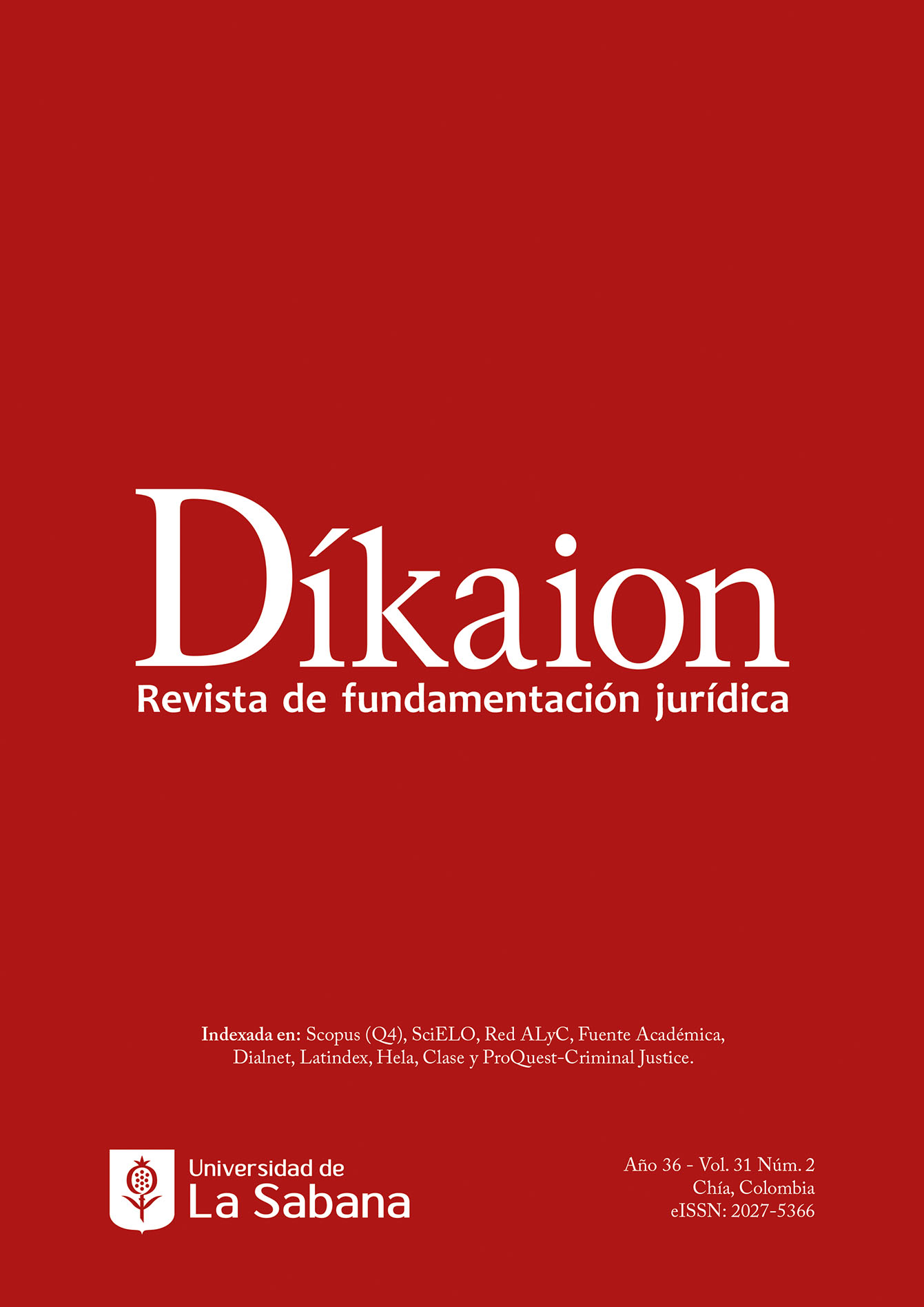The Classical Common Good and the State
DOI:
https://doi.org/10.5294/dika.2023.32.1.7Keywords:
Political community, Thomas Aquinas, Macpherson, Karl Polanyi, HobbesAbstract
This study aims to consider whether it is possible to speak of the common good within the parameters of the State; in other words, whether the State and the common good are even compatible. The starting hypothesis is one of incompatibility. We will begin by approaching the original meaning of the common good, which has its roots in classical and medieval traditions. Although numerous authors have adopted this approach, in our case, it is a matter of pointing out precisely those features of the classical common good that will contrast to a greater extent with the theorization of the State. Therefore, this paper prioritizes primary sources. Secondly, to tackle the subject matter of this work, we will examine the radical changes in the anthropological and economic-social assumptions that are contemporary to the theorization and emergence of the State and relevant to understand why it makes no sense to speak of the common good in the framework of the State.
Downloads
References
Aristóteles, Ética a Nicómaco, Madrid, Centro de Estudios Constitucionales, trad. de Julián Marías y María de Araujo (1949), 1994.
Aristóteles, Política, Madrid, Gredos, edición con introducción, traducción y notas de Manuela García Valdés, 1988.
Castaño, S. R., “¿Es el bien común un conjunto de condiciones?”, Ius Publicum 29 (2012), pp. 17-33.
Cavanaugh, W. T., “Killing for the telephone company: Why the nation-state is not the keeper of the common good”, Modern Theology 20 (2) (2004), pp. 243-274. DOI: https://doi.org/10.1111/j.1468-0025.2004.00252.x
Cruz Prados, A., Filosofía Política, Pamplona, Eunsa, 2009.
Downing, L. A. y Thigpen, R. B., “Virtue and the common good in liberal theory”, The Journal of Politics 55 (4) (1993), pp. 1046-1059. DOI: https://doi.org/10.2307/2131947
Dupré, L., “The common good and the open society”, The Review of Politics 55 (4) (1993), pp. 687-712. DOI: https://doi.org/10.1017/S0034670500018052
Hobbes, T., Leviatán, México D.F., Fondo de Cultura Económica, trad. de Manuel Sánchez Sarto, 1996.
Hussain, W., “The common good”, en Stanford Encyclopedia of Philosophy, Stanford University, 2018.
Kavka, G. S., Hobbesian Moral and Political Theory, Princeton, Princeton University Press, 1986. DOI: https://doi.org/10.1515/9780691222967
Keys, M. M. y Godfrey, C., “Common good”, en M. Bevir (ed.), Encyclopedia of Political Theory, London, Sage, 2010, pp. 237-243.
Lachance, L., Humanismo Político, Pamplona, Eunsa, 2001.
Letelier Widow, G., “El bien común político”, en A. Miranda Montecinos y S. Contreras Aguirre (eds.), Problemas de Derecho Natural, Santiago de Chile, Legal Publishing, 2015, pp. 413-446.
Macpherson, C. B., The Political Theory of Possessive Individualism, Oxford University Press, 1962. Se cita la traducción castellana de Juan-Ramón Capella, La teoría política del individualismo posesivo. De Hobbes a Locke, Madrid, Trotta, 2005.
Martinich, A. P., The Two Gods of Leviathan, Cambridge, Cambridge University Press, 1992. DOI: https://doi.org/10.1017/CBO9780511624810
Murphy, T., “Bien común”, Eunomía. Revista en Cultura de la legalidad 14 (2018), pp. 191-205. DOI: https://doi.org/10.20318/eunomia.2018.4163
Platón, Critón, Madrid, Instituto de Estudios Políticos, trad. de M. Rico Gómez, 1970.
Polanyi, Karl, The Great Transformation, New York, Farrar & Rinehart, 1944. Se cita la traducción de Eduardo Suárez, La gran transformación, México, Fondo de Cultura Económica, 2011.
Segovia, J. F., “Liberalismo y bien común”, Verbo 489-490 (2010), pp. 811-860.
Smith, Th. W., “Aristotle on the conditions for and limits of the Common Good”, American Political Science Review 93 (3) (1999), pp. 625-636. DOI: https://doi.org/10.2307/2585578
Spaemann, R., Crítica de las Utopías Políticas, Pamplona, Eunsa, 1980.
Tomás de Aquino, Summa Theologiae (edición bilingüe), Madrid, Biblioteca de Autores Cristianos, 1947-1960.
Tomás de Aquino, In X libros Ethicorum Aristotelis ad Nicomachum expositio, Romae, Marietti, 1949.
Published
How to Cite
Issue
Section
License
Copyright (c) 2023 Díkaion

This work is licensed under a Creative Commons Attribution-ShareAlike 4.0 International License.
1. Proposed Policy for Journals That Offer Open Access
Authors who publish with this journal agree to the following terms:
This journal and its papers are published with the Creative Commons License Attribution-NonCommercial-NoDerivatives 4.0 International (CC BY-NC-ND 4.0). You are free to share copy and redistribute the material in any medium or format if you: give appropriate credit, provide a link to the license, and indicate if changes were made; don’t use our material for commercial purposes; don’t remix, transform, or build upon the material.










